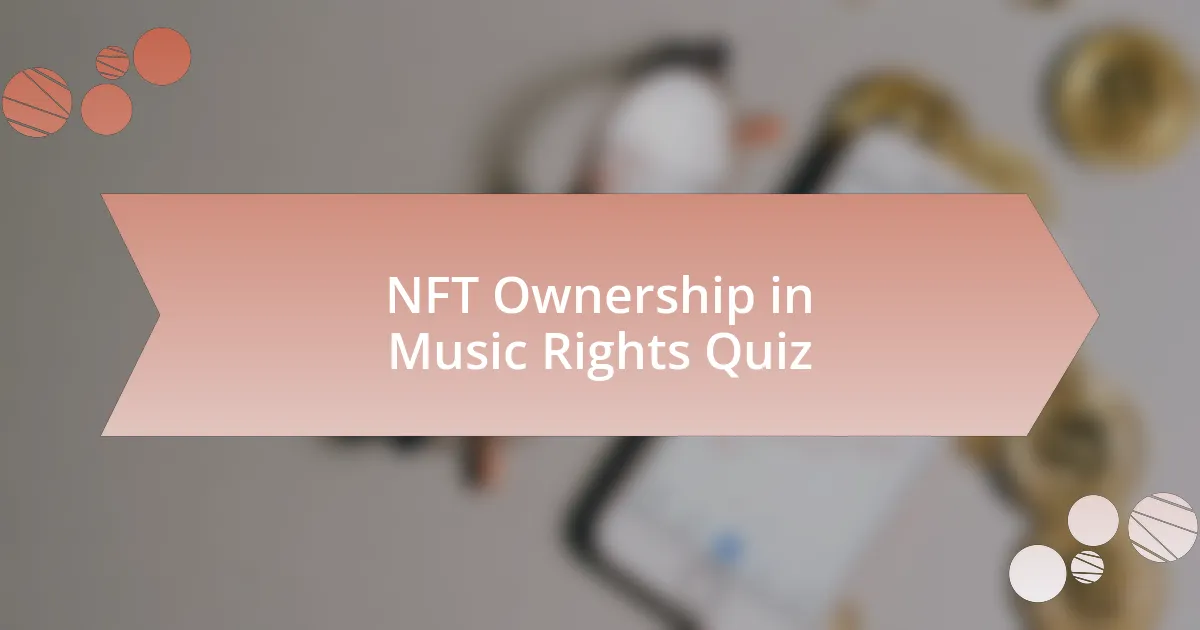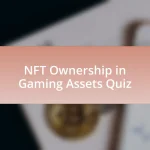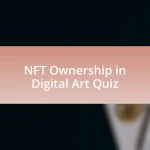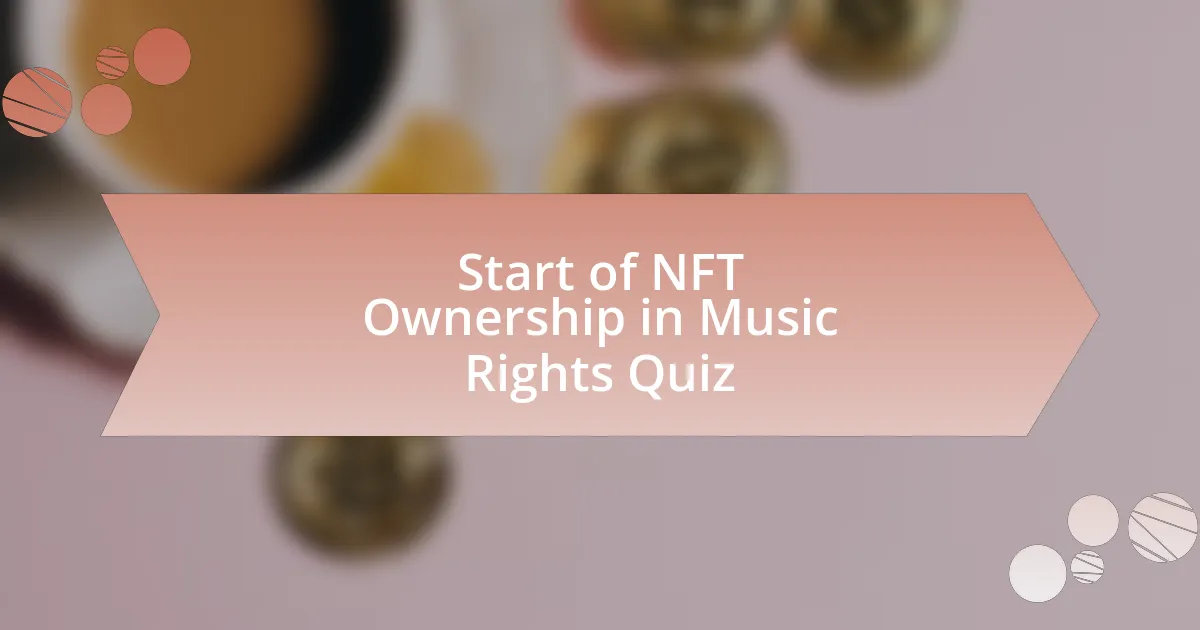
Start of NFT Ownership in Music Rights Quiz
1. What is an NFT in the context of music rights?
- A digital asset stored on a blockchain representing ownership or rights to music.
- A physical album sold in stores.
- A type of music streaming subscription service.
- A live concert ticket.
2. How does NFT technology benefit independent musicians?
- NFTs increase physical merchandise sales for musicians, guaranteeing immediate cash.
- NFTs guarantee all musicians a record deal with major labels for their work.
- NFTs simplify royalties and rights management, creating direct connections between artists and fans.
- NFTs eliminate the need for artists to promote their work and reach new audiences.
3. What is the role of royalties in the NFT ownership model?
- Royalties serve as a one-time payment made to the original creator.
- Royalties are optional payments decided by the buyer of the NFT.
- Royalties are fees that marketplaces charge for listing NFTs.
- Royalties allow creators to earn a percentage from secondary sales of their NFTs.
4. How does an artist tokenize their music as an NFT?
- Artists can record their music onto a vinyl record to create an NFT.
- Artists can mint their music as NFTs by creating a digital asset on a blockchain.
- Artists can upload their music to social media to convert it into an NFT.
- Artists can sell their music as physical CDs to make them NFTs.
5. In what ways can NFTs disrupt traditional music publishing?
- NFTs restrict artists from earning royalties after the first sale.
- NFTs force artists to give up ownership rights when sold.
- NFTs allow artists to retain more control over their work and potentially earn more royalties compared to traditional record label contracts.
- NFTs complicate the relationship between artists and their fans.
6. Can NFTs be utilized for live performance rights?
- No, NFTs are solely for artwork and collectibles.
- No, NFTs cannot be used for any rights.
- Yes, NFTs can be used for live performance rights.
- Yes, NFTs only provide physical merchandise rights.
7. How do NFTs provide a transparent ownership history?
- Transactions are logged in a private database known only to the seller.
- NFTs are stored on central servers tracking ownership.
- Ownership is verified through artist certificates issued physically.
- The blockchain records ownership changes and transfer history.
8. What is the significance of fractional ownership in music NFTs?
- Fractional ownership means selling all rights to a single buyer.
- Fractional ownership is only relevant for physical art pieces.
- Fractional ownership eliminates the need for royalties for artists.
- Fractional ownership allows multiple investors to own a share of a music NFT.
9. How do NFTs help combat music piracy?
- NFTs make music piracy more widespread and easier to execute.
- NFTs allow for unlimited free downloads of music tracks.
- NFTs eliminate the need for artists to manage any copyrights.
- NFTs provide enhanced copyright protection and ongoing royalties from sales.
10. What elements are included in an NFT smart contract for music?
- A temporary file format for music storage before download.
- A virtual currency used for buying music albums only.
- A digital asset stored on a blockchain representing ownership or rights to music.
- A social media platform for sharing music tracks online.
11. How do NFTs enable fan engagement and interaction?
- NFTs require fans to attend physical events exclusively, hindering online interaction.
- NFTs create direct connections between artists and fans, fostering engagement and community.
- NFTs enable fans to download music for free from platforms.
- NFTs limit interactions between artists and their audiences by focusing solely on sales.
12. What potential risks do musicians face when using NFTs?
- Limited access to music production software tools.
- A lack of financial support from record labels.
- Inability to perform live concerts due to travel restrictions.
- Legal challenges related to copyright and intellectual property rights.
13. How can NFTs be linked with fan experiences in live music?
- NFTs can offer unique upgrades to concert experiences for fans.
- NFTs can prevent fans from attending live events altogether.
- NFTs can completely replace traditional music streaming services.
- NFTs can only be used to sell related merchandise like t-shirts.
14. What is the impact of NFT marketplaces on music consumption?
- NFTs reduce the visibility of independent artists, making it harder for them to reach audiences.
- NFTs decrease the overall quality of music content available to consumers.
- NFTs can significantly increase revenue opportunities for musicians through direct sales and royalties.
- NFTs eliminate the need for music streaming platforms, as musicians will only sell NFTs.
15. How do royalties from NFTs differ from streaming services?
- Royalties from NFTs are fixed per sale only.
- Royalties from NFTs are paid upon each resale.
- Royalties from NFTs are decided by streaming platforms.
- Royalties from NFTs are not transferable.
16. What is the relationship between NFTs and copyright infringement in music?
- NFTs have no impact on music ownership or copyright laws.
- NFTs eliminate the need for copyright entirely in the music industry.
- NFTs can infringe on music copyright if used without permission from the artist.
- NFTs guarantee music copyright protection without any legal concerns.
17. How do musicians promote their NFTs to fans?
- By releasing physical copies of their music.
- Through social media and online announcements.
- Via traditional radio promotions.
- Through concert ticket sales only.
18. What happens to music rights upon the sale of an NFT?
- Music rights revert to the NFT marketplace after the sale.
- Music rights are ignored when an NFT is sold, no rights change hands.
- Music rights are fully transferred to the buyer upon the sale of an NFT.
- Music rights are retained by the original creator upon the sale of an NFT.
19. How do geographical laws affect NFT music sales?
- Geographical laws only regulate physical music sales.
- Geographical laws can influence NFT sales by establishing jurisdiction for transactions.
- Geographical laws are irrelevant to digital assets like NFTs.
- Geographical laws have no effect on NFT music sales.
20. What challenges do artists face when navigating NFT platforms?
- Artists face difficulties in understanding complex platform rules and fees.
- Artists have no options for managing their royalties.
- Artists always retain full control over their work without issues.
- Artists struggle to find buyers for their music.
21. How are revenues tracked and distributed through NFT sales?
- Revenue from NFT sales is shared only with collectors and not the artists.
- All creators receive equal payouts from NFT sales, regardless of ownership.
- NFT revenue is distributed through a centralized bank payment system.
- NFTs can include provisions for the original creator to receive a percentage of resale revenue.
22. What are the benefits of using NFTs for music collaborations?
- NFTs eliminate the need for copyright protection in music.
- NFTs only serve as a marketing tool without financial benefits.
- NFTs limit musicians` ability to collaborate with other artists.
- NFTs provide perpetual royalties and new revenue opportunities for musicians.
23. Can NFTs facilitate ownership transfers of music catalog rights?
- Yes, NFTs can facilitate ownership transfers of music catalog rights.
- Yes, only traditional contracts can facilitate ownership transfers.
- No, NFTs only apply to visual art and not music rights.
- No, NFTs cannot represent any rights to music ownership.
24. What ethical considerations arise from using NFTs in music?
- Ethical challenges include ensuring fair pricing for NFTs, preventing price manipulation, and promoting equitable access to digital art.
- Ethical dilemmas focus solely on the technology used to create NFTs.
- Ethical considerations in music NFTs are irrelevant to artist royalties.
- Ethical issues are primarily concerned with the physical distribution of music.
25. How has the emergence of NFTs affected music streaming platforms?
- NFTs have primarily reduced the income for musicians from digital platforms.
- NFTs have replaced all existing music streaming platforms, leading to their closure.
- NFTs have had no impact on traditional music sales and distribution methods.
- NFTs have the potential to significantly increase revenue streams for musicians by providing perpetual royalties and new revenue models.
26. What is the role of community governance in music NFTs?
- Community governance limits artists` control over their music NFTs and sales.
- Community governance eliminates the need for fans in the NFT ecosystem.
- Community governance allows artists and fans to collaborate and influence decisions within music NFT projects.
- Community governance establishes strict regulations that cannot be altered by members.
27. How do NFTs empower underrepresented artists in the music industry?
- NFTs require artists to give up their copyrights when sold.
- NFTs only help famous artists increase their popularity.
- NFTs allow artists to sell their work directly to fans and control their rights.
- NFTs prevent underrepresented artists from finding audiences.
28. What technologies support the creation and management of music NFTs?
- Blockchain and smart contracts
- 3D printing and drone technology
- Augmented reality and cloud storage
- Virtual reality and streaming
29. How do NFTs impact the secondary market for music sales?
- NFTs can provide continuous royalty payments to artists from secondary sales.
- NFTs restrict artists from earning any money after the initial sale.
- NFTs prevent musicians from selling their music in physical stores.
- NFTs eliminate all revenue for musicians when resold.
30. How can NFTs serve as a marketing tool for new music releases?
- NFTs can automatically make all music free to stream online.
- NFTs can replace traditional music videos entirely.
- NFTs can create exclusive experiences for fans to engage with new music.
- NFTs can guarantee a number one album chart position.

Congratulations! You’ve Successfully Completed the Quiz!
Thank you for participating in our quiz on ‘NFT Ownership in Music Rights.’ We hope you found it both enjoyable and enlightening. Engaging with this cutting-edge topic can deepen your understanding of how technology is reshaping the music industry. Your responses reflect a commitment to learning more about the intersection of music and digital assets.
Throughout the quiz, you may have uncovered various aspects of NFT ownership, such as how artists can monetize their work and the implications for music rights. These insights are essential in today’s rapidly evolving landscape. Understanding these concepts not only enhances your knowledge but also allows you to appreciate the innovations that are changing how music is created, distributed, and owned.
To further expand your knowledge, we invite you to explore the next section on this page dedicated to ‘NFT Ownership in Music Rights.’ This resource is designed to provide a comprehensive overview of the topic, offering deeper insights and real-world examples. Dive in and continue your journey into the fascinating world of NFTs in music!
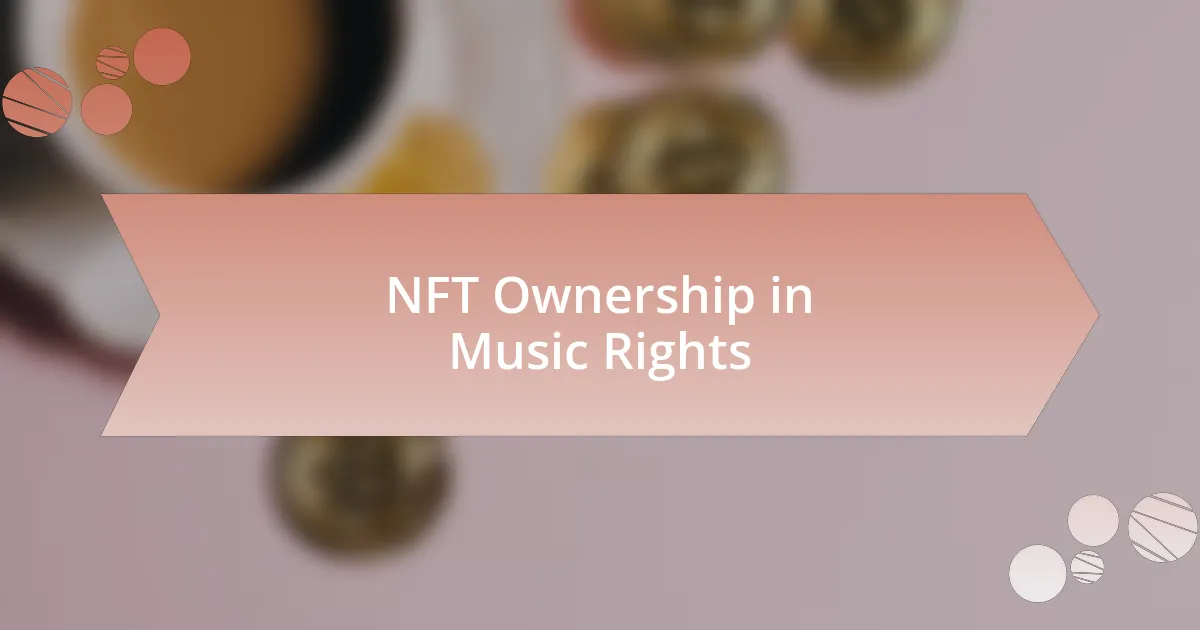
NFT Ownership in Music Rights
Understanding NFTs and Their Role in Music Rights
Non-Fungible Tokens (NFTs) are unique digital assets verified using blockchain technology. In the context of music rights, NFTs can represent ownership of music tracks, albums, or other related intellectual properties. They provide a way for artists to sell their work directly to consumers. This model shifts control from traditional intermediaries, such as record labels, to the artists themselves. The distinctiveness of NFTs lies in their indivisibility and authenticity, making them ideal for representing ownership of creative works.
The Benefits of Using NFTs for Music Ownership
NFTs offer several advantages for music ownership. Artists retain a larger share of profits from sales compared to conventional music distribution methods. Smart contracts can automate royalty payments, ensuring that creators get paid each time their music is resold or streamed. Furthermore, NFTs enable direct engagement with fans, allowing artists to build communities and potentially create new revenue streams through exclusive content. This democratization of music ownership empowers artists and enhances transparency in revenue distribution.
Legal Implications of NFT Ownership in Music
The legal landscape surrounding NFT ownership in music is complex and still evolving. Ownership of an NFT does not automatically confer copyright ownership. Instead, it often grants limited usage rights specified by the creator. Artists need to clearly define what rights a buyer obtains when purchasing an NFT. Enforcing these rights can also be challenging due to the decentralized nature of blockchain. Thus, artists should seek legal advice to ensure clarity and protect their intellectual property properly.
Challenges and Risks Associated with NFT Music Rights
Despite their benefits, NFTs in music rights come with risks. The volatility of the NFT market can lead to significant financial losses for artists who invest heavily but fail to find a buyer. Additionally, the environmental impact of blockchain technology raises ethical concerns, particularly regarding energy consumption. There is also the threat of copyright infringement, as unauthorized reproductions of music can occur within the NFT space. Artists must be cautious and stay informed to navigate these challenges effectively.
The Future of Music Rights and NFTs
The future of music rights and NFTs suggests growing integration within the music industry. As technology develops, artists may find innovative ways to utilize NFTs for richer fan experiences. This could include exclusive live performances or special editions of music. Traditional record labels may adapt and incorporate NFTs into their business models, blending conventional and modern practices. The success of this integration will depend on continuous adaptation to regulatory frameworks and market demands.
What is NFT ownership in music rights?
NFT ownership in music rights refers to the acquisition of rights to music through non-fungible tokens (NFTs). These tokens, stored on a blockchain, represent ownership of a specific piece of music or rights to its use. By owning an NFT, a person can possess unique rights that are often outlined in a smart contract, including royalties and distribution rights. The use of NFTs in music allows artists to monetize their work directly and enables fans to support their favorite musicians through direct ownership.
How does NFT ownership in music rights work?
NFT ownership in music rights works by creating digital assets that are linked to music files or contracts. When an artist mints an NFT, they encode the ownership details and rights associated with their work onto the blockchain, ensuring transparency and security. Buyers can purchase these NFTs on various platforms. The ownership is then recorded on the blockchain, which verifies authenticity and transfers of rights. This process ensures that artists can receive royalties directly through blockchain transactions whenever their music is used or sold.
Where can musicians issue NFTs for their music rights?
When did NFT ownership in music rights become prominent?
NFT ownership in music rights became prominent around 2020, coinciding with the rise of NFTs in the digital art world. High-profile sales, such as musician Grimes selling her NFT artwork for nearly $6 million, helped to highlight the potential of NFTs for artists. By 2021, several musicians, including Kings of Leon and 3LAU, began issuing NFTs for their music, further driving awareness and popularity in the music industry.

